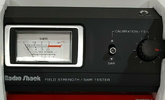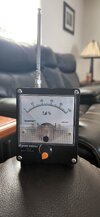I feel the need to buy a Field Strength meter. I'm going to try something a little different, than in the past, with the new truck antenna install. Do those cheap Astatic SWR/Field Strength meters work okay or do we need to spend some serious coin on a meter. This would just be for my own personal use.
Planning on mounting a 5' Skip Shooter on the back of the sleeper.
New Truck with the typical trailer we pull

JD
Planning on mounting a 5' Skip Shooter on the back of the sleeper.
New Truck with the typical trailer we pull

JD



